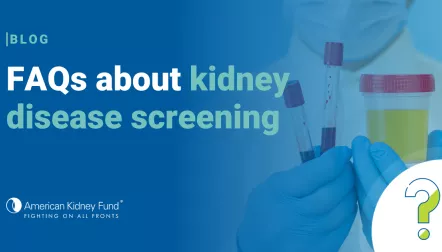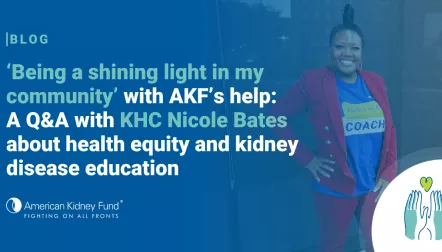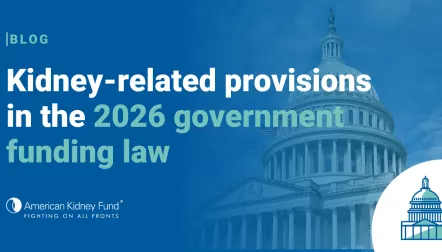
Blog post
Ambassador spotlight: Timothy Atkins

What made you want to become an AKF Ambassador?
I have always tried to do my best to help others with kidney disease. Being an American Kidney Fund (AKF) Ambassador is another way I felt I could help those who suffer.
How has being an Ambassador helped you?
I find that in helping others, you help yourself. In many ways, getting your mind off your own problems and realizing there are others dealing with the same illness and experiences you are — some much worse than you are — is very grounding. It's also encouraging to know that I am not the only person with kidney disease who wants to give back to the community, and seeing all the other Ambassadors and hearing their stories is a source of encouragement.
What have you learned from being an Ambassador?
Everyone can make a difference. Many of us want to help, but sometimes we are not sure what direction to take. AKF lets us Ambassadors get involved in many different ways — just reach out to AKF to find out how!
Why should others become Ambassadors?
Deciding to take an active role in advocating for your health care and joining with a larger group working toward a common goal is when change can occur. It's hard to build a strong foundation by yourself, but if you have a network of 15,000 other Ambassadors fighting with you, that's another story.
How would you like to stay connected to other Ambassadors?
Email is always a good method of communication. Zoom, Teams or other virtual meeting platforms are also good for event information and education.
What is something you've learned about kidney disease and dialysis that you wish you knew a lot sooner?
How great it is to do dialysis at home! Home dialysis is hands down my preferred treatment modality.
What do you wish elected officials knew about dialysis patients?
I wish elected officials understood the struggles we go through with insurance and health costs, as well as what we face daily just to be functioning members of society. I also wish there was more understanding around ways to detect kidney disease before it leads to kidney failure and dialysis.
Do you have any advice for newly diagnosed kidney patients?
Stay positive and optimistic, which is sometimes easier said than done, right? Have a strong spiritual relationship with God if that's your thing, or find a similar connection to something else you love. For me, my faith has become a lifeline when there seems to be nothing else to grasp onto, and it's the only reason I'm still here — after 43 years of dialysis!
How does it help having a family member be part of the process?
It helps very much to know there is someone else by my side to share my struggles, help me deal with my health issues and go through the happy and sad times with me. It's a wonderful thing to have. A good friend can help, too.
What are some interesting facts about yourself that you'd like to share?
I am a former Guinness World Record holder for the longest time on dialysis treatments.
I have been a radio announcer for over 30 years. I do a radio show on Joyful FM in Johannesburg South Africa, and a podcast for the Native American population called "Native Thunder" (Google it!).
My wife and I sponsor two little girls in Bolivia and Ethiopia through an organization that helps third world children, and I am helping to start a new orphanage in Belize with a friend. We help sponsor Mercy Ships, a great nonprofit that provides free lifesaving surgeries to children aboard hospital ships. I also help with another organization that runs drug and alcohol rehabilitation centers. I hope to do some work in Africa to help teach people about broadcasting.
I wish there was a way to get dialysis paid for in other countries, at least for a short period. In many countries the treatment cost is less than the U.S. and they could actually save money! It would be another way to make life more fulfilling for dialysis patients.





